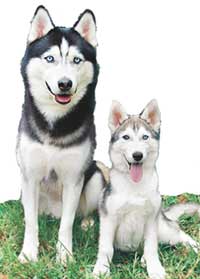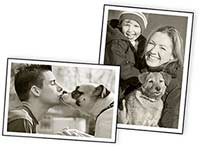
FIRST, do you really want a dog?
Dogs are wonderful companions, they can perform all sorts of useful tasks, they never talk back and "happiness is a warm puppy". But before you take the plunge and get a dog, remember...
 |
Dogs Take Time.They are very sociable animals who dislike being alone. Do you have the time every day to spend walking, feeding, playing with your dog? And they live for ten to twenty years, so this is a long-term commitment. |
 |
Dogs Need SpaceDo you have a fenced yard? If not, can you make other suitable, realistic arrangements for your dog to get adequate exercise? |
 |
Dogs Cost MoneyThey must be fed, they need health care, they need grooming. Your house will need more cleaning with a dog, and you will have to replace or repair things that puppies will damage. |
So you really do want a dog. So now, you must ask,
What breed?

Dogs are the most varied species in existence, ranging in size from the six-pound Chihuahua to the 200-pound Mastiff, and from the sociable Golden Retriever to the dominant, aggressive Akita.
Before selecting a breed for your new dog, carefully consider your own personality, your family situation, what you expect of your dog (watchdog, companion for your children, hunting, etc.), whether you live in a house with a fenced yard or in an apartment, etc. Become acquainted with the eight major groups (Sporting, Hound, Working, Terrier, Toy, Non-Sporting, Herding and Miscellaneous) and their characteristics.
Do not decide based on looks alone. Take your time before you decide on what breed will become this important addition to your family.
Get a copy of one of these top rated books.Do Some Research on different breeds, and what kind of behavious and traits to expect. Both are are top rated and an excellent resource for helping you make this important choice in an informed way. |
||
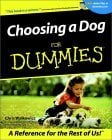 Click for more information on and to buy at lowest price |
 Click for more information and to buy at lowest price |
|
"This book is a winner." Esme Treen, editor emeritus, The Spotter Quarterly Praise for Choosing a Dog For Dummies "This is a living reference work for both the new and the long-time dog lover." — Robert J. Berndt, DVM "Before you even think about getting a dog … you have to read this book." — Jacklyn E. Hungerland, PhD, author, dog breeder, and judge |
A MUST read for prospective owners & current ones. Best features: breed specific behaviors; potential health problems of each breed; owner suitability: hard to find all this in one book! Covers all AKC as well as other breeds. Easy to read, good color photos. Emphasizes the importance of knowing the basics of each breed so you can find a good match for both you and the dog! |
|
Now that you know what breed you want,
Where to find a dog?
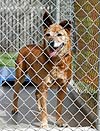
First, consider adopting a dog from a shelter or rescue organization. Millions of dogs are euthanized each year, and you might just find your perfect companion at the local pound or with through a rescue group for your favorite breed. See the rescue links at Kyler Laird's animal rescue resources and the AKC National Breed Club Rescue Network.
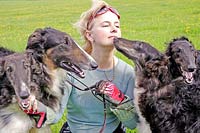
Find a serious hobby breeder. A serious hobby breeder will usually belong to a breed club, be involved in showing dogs, present a clean environment with healthy, well-socialized puppies, be at least as interested in your qualifications to be an owner as you are in the breeder, give you a record of dates and types of inoculations and worming and insist that you take the pup to a vet for a check-up and to continue with inoculations, give you written instructions on feeding, training and care, provide a pedigree and registration application form; provide references; provide a written contract with conditions of sale and warranty; and assure you that the relationship between you and the breeder is a continuing one.
For a detailed list of what to look for in a breeder, click here to view our Breeder Checklist.
Avoid:
- Pet shop or dealer puppies, who are poorly bred and raised and treated as merchandise;
- "Backyard breeders", who own a dog but often are not knowledgeable and typically think it will be "fun" or "profitable" to have puppies;
- A breeder who lets you handle a very young puppy, as there is a real risk of transmitting disease before they are vaccinated;
- Signs of neglect such as lack of water, pans of uneaten food and dirty conditions;
- Abreeder who will sell a puppy under seven weeks of age, as early separation from the dam and littermates can be very detrimental both psychologically and physically.
Find conveniently located breeders of the breed you have selected in our breeders.NET directory, but remember, it is up to you to check them out.
Now that you have found a breeder, you must prepare for Selecting Your Dog. Adult dogs require less care than puppies but may have developed some behavior problems and can be difficult to train. Puppies are fun and easier to train and socialize, but require a lot of care. If you are inclined to the adult dog, consider a rescue dog. There are breed rescue groups (of which many can be found in our Directory) who often can direct you to a dog of your favorite breed who badly needs a home. Picking a puppy from the litter. The dominant pup of the litter will usually be the first to approach you. This puppy will probably be difficult to train and discipline, so if you are inexperienced, beware. Avoid also a pup that is extremely shy; it may be difficult to socialize--also avoid the runt of the litter, who may have serious health problems in its future. Stay away from shy, whimpering, fearful puppies, puppies with dull coats, crusty or running eyes, signs of diarrhea, and rashes or sores on their abdomens. Enjoy your dog, and love him or her as he or she will love you!
We accept no responsibility for the quality of any breeder included in the directory. We suggest you take your time, visiting a few breeders, learning as you go. Sometimes it's tough, but try to avoid falling in love with the first puppy you see.
Adult or puppy?
